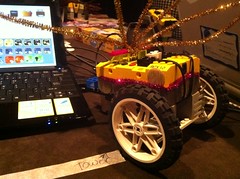 I'm currently in Long Beach, California for the MacArthur Foundation-sponsored Digital Media and Learning Conference. The DML is a three day gathering of about 500 academics, educators, nonprofits, techies, and funders focused on "fostering interdisciplinary and participatory dialog and linking theory, empirical study, policy, and practice." I.e. the event is intended to get folks who work on digital learning to talk across the aisle with others who are working and studying in this space.
I'm currently in Long Beach, California for the MacArthur Foundation-sponsored Digital Media and Learning Conference. The DML is a three day gathering of about 500 academics, educators, nonprofits, techies, and funders focused on "fostering interdisciplinary and participatory dialog and linking theory, empirical study, policy, and practice." I.e. the event is intended to get folks who work on digital learning to talk across the aisle with others who are working and studying in this space.
This is the second annual DML, and so far it looks to be quite the success. Last year's had about 300 participants, who were drawn largely from academia. This year it has grown to about 500 participants, with a wider cross section of nonprofits, educators, foundation officers, and tech industry reps. Adding to the MacArthur support is backing from the Pearson Foundation, Mozilla Foundation and Microsoft.
So the field of digital media and learning is definitely growing.
I am enjoying meeting old colleagues from Global Kids, the Field Museum of Chicago, Digital Youth Network, National Writing Project and others, as well as meeting many more folks from a variety of institutions. It's a congenial atmosphere for networking, particularly during the evening exhibition time but also during the workshops, which all seem to include breakout small groups.
I did my best to spread myself out among different workshops, just to get a flavor of what people are working on and talking about. I ran into lots of heady talks on alternative assessment for educational outcomes, creating online spaces that enhance youth learning and engagement, developing games-based curriculum, etc. In one room, people were engaged in a spirited game of "werewolf," gleefully "killing" each other and accusing each other of being lycanthropes.
I really liked the workshop called "Remixing Human Rights: Rethinking Civic Expression, Safety, Privacy and Consent in Online and Mobile Video" led by Sam Gregory and Elizabeth Losh. The workshop dealt with the various societal implications of all of the human rights related videos that have exploded in the past few years, particularly what is happening in the Arab World right now. There are a number of troubling but important issues related to remix, re-appropriation, privacy, and security raised by these videos, that we talked in-depth about. You can see a number of links to various videos, as well as the key questions we discussed, at this link.
 Last night there were a number of interesting digital learning projects on display during the reception. I was exhausted by this point, so didn't get to see as much as I would have liked. But I was particularly impressed TangibleK, an NSF-funded project that teaches kindergarten age youth about the basics of programming and robotics using colorful blocks that correspond to different commands and operants in a basic programming language. The kids connect the blocks to create different series of commands, which are then read by a computer using some kind of sensor. The commands are then delivered to a custom Lego Mindstorm powered robot that executes the commands, like "run around in a circle and then play a song." Really fun stuff.
Last night there were a number of interesting digital learning projects on display during the reception. I was exhausted by this point, so didn't get to see as much as I would have liked. But I was particularly impressed TangibleK, an NSF-funded project that teaches kindergarten age youth about the basics of programming and robotics using colorful blocks that correspond to different commands and operants in a basic programming language. The kids connect the blocks to create different series of commands, which are then read by a computer using some kind of sensor. The commands are then delivered to a custom Lego Mindstorm powered robot that executes the commands, like "run around in a circle and then play a song." Really fun stuff.
I will be here for a couple of more days, just taking in all what is happening in this field. In terms of my own interest, I don't see any strong references to virtual worlds so far, other than the QuestAtlantis project, a long-standing educational virtual project supported by MacArthur. But it's only just begun.